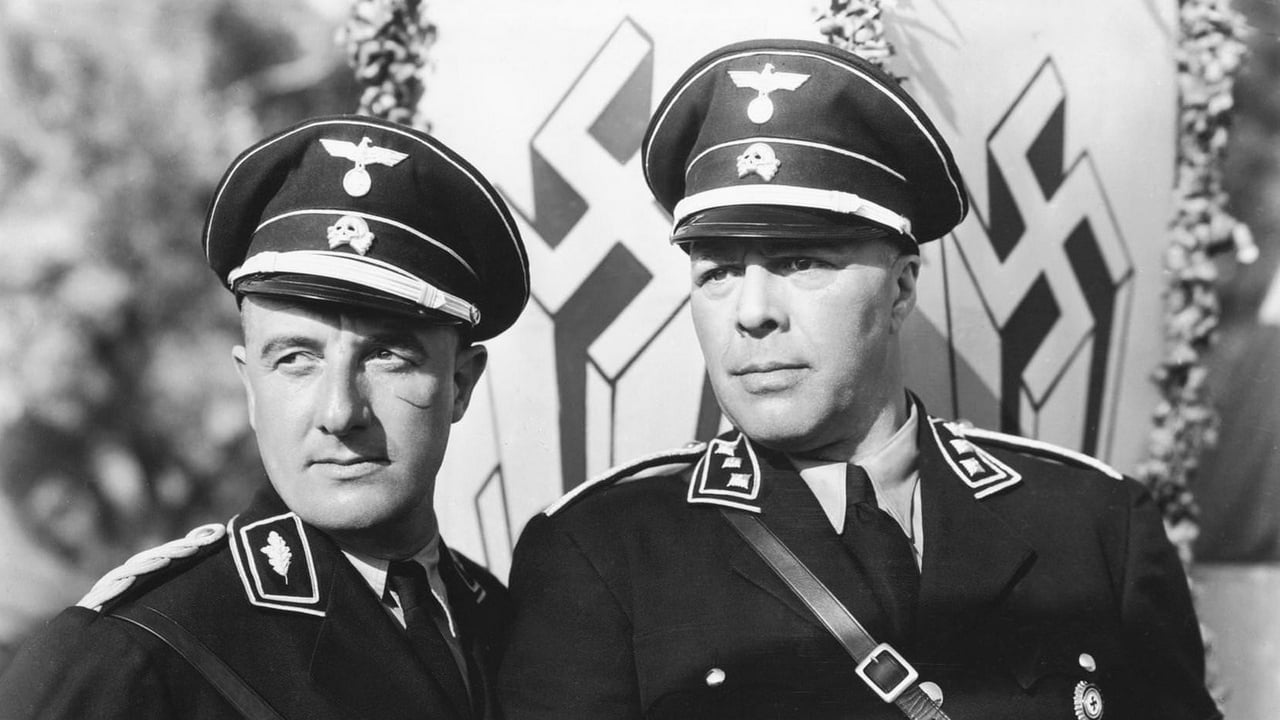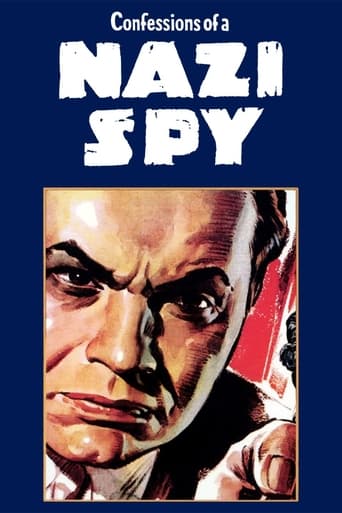

The performances transcend the film's tropes, grounding it in characters that feel more complete than this subgenre often produces.
... View MoreThe film makes a home in your brain and the only cure is to see it again.
... View MoreBlistering performances.
... View MoreA film of deceptively outspoken contemporary relevance, this is cinema at its most alert, alarming and alive.
... View MoreHollywood produced this one as the war in Europe had barely begun and the US was a couple of years away from Pearl Harbor. They had correctly identified the threat from Nazi Germany, though, and made a pretty accurate assessment of the consequences involved. "Confessions Of A Nazi Spy" is better than it sounds, and is not a story extracted from a cheap novel.Nutshell; Some German-Americans felt an attachment to their Fatherland at the outbreak of the war, and some bought into the narrative and became Nazi sympathizers. Schneider (Francis Lederer) is one of those. He is inspired by the speeches of Dr. Kassell (Paul Lukas) and becomes a spy - more of a messenger - for a local subversive Nazi group. He is discovered by the FBI (Edw. G. Robinson), loses his nerve and informs on the group. Any more of the plot will spoil the story.The picture is related in semi-documentary style which gives it a patina of authenticity and is directed by Hollywood veteran Anatole Litvak, who adds the required tension and who made several noteworthy noir and crime dramas in his career. Lederer and Lukas supply the villains and Robinson the hero in this surprisingly good rendition of a story of troublesome times to come for America.
... View MoreThat's the analogy which FBI agent Edward G. Robinson of the espionage division makes as he reflects on the Nazi spy ring he's fought so cleverly to bring down. This ring goes everywhere, from a Scottish village where one of the townsfolk (Eily Malyon) acts as a Nazi postal agent for mail coming in and going out, to the manicurist on an Atlantic cruise ship. The Nazis range from blatant (George Sanders) to soft-spoken (Paul Lukas) to a variety of small fries doing the little errands that have a greater consequence in mind.It's all done with the purpose of destroying democracy and evidence of its effectiveness can be seen in society today. This semi-documentary style drama was the first serious expose on Nazi evils to warn Americans of impending dangers. Totally passive/aggressive in its attempts to win innocent German Americans over to its side, the Nazi agenda here is more dangerous than any mob which Robinson ever ran (or fought to expose and destroy). You may find the film overly melodramatic in its method, but you won't be unaffected by it, especially if you value the democratic principals this country was founded upon and is desperately fighting to hold onto only slightly more than 70 years later.If this film opens you up to reflect on how this applies to society today, you have learned a thing or two, and like another Warner Brothers' anti-Nazi film ("All Through the Night"), revealed in its script, you'll be telling others, "We've got to wake up!". This reminds us freedom is never free, and we must work hard to retain it.
... View MoreI'd never heard of this film but when I saw it in the cable lineup for Turner Classics this morning I had to be there, especially with Edgar G. Robinson heading the cast. Interestingly, Robinson doesn't even appear until about half way into the picture as an FBI agent hot on the trail of a German-American turned Nazi spy. I have to admit, there were times the story got pretty chilling for me the way it portrayed Nazi infiltration into American daily life look so easy to do. The blind obedience to Adolph Hitler professed by Dr. Karl Kassel (Paul Lukas) in his speeches to local bund gatherings is somewhat hard to imagine today, but then again, I've seen era footage of a Hitler rally in Madison Square Garden, so I have to believe this wouldn't have been impossible.What I thought was pretty cool was the way Agent Renard (Robinson) got Kurt Schneider (Francis Lederer) to crack, playing to his vanity and sense of self importance. No doubt the job was made easier by Schneider's inability to make his spy activities pay off in a big way with his German contact Schlager (George Sanders). It's also noteworthy to mention how Germans in the film reacted in horror to the mere mention of the word 'Gestapo'; every time it was uttered it brought on a near panic attack.I'm really curious how this film was received back when first released. Gallup polls taken in 1936 showed that only one in twenty Americans were in favor of America getting involved in another war, but it took only two more years of Hitler's aggression to convince Americans that strengthening our Armed Forces for a conflict would be in our best interest. In perhaps the best line of dialog that would preview America's eventual entry into World War II, Attorney Kellogg (Henry O'Neill) states his considered view to Agent Renard that "When our basic liberties are threatened, we wake up."
... View MoreEdward G. Robinson, Francis Lederer, Paul Lukas and George Sanders star in "Confessions of a Nazi Spy," a 1939 film done in anticipation of the United States becoming involved in World War II. There was a proliferation of the German-American bundts, and Hitler was using them to spread Nazi propaganda in the U.S. Robinson, as an FBI man, is brought in to head an investigation of spy activities.The film is done in semi-documentary style - sort of a dramatized documentary. Sanders is the head of one such bundt, and he sports a short haircut and a very convincing German accent. Lederer plays a amateur spy in it for the money and the power trip, and Lukas is a doctor who hides behind his profession but is really an impassioned believer in the Reich who helps get the spy material through. All of the performances are very good and hit the right tone."Confessions of a Nazi Spy" is heavy on the propaganda as should be expected, warning the country that there are Nazis everywhere. Were there? Hard to say but given the Germans who emigrated to the U.S. who still had families back home, it's entirely possible.The most interesting thing about the film was that all these Nazi infiltrators were living on U.S. soil expressing belief in the Reich and Hitler - yet each time one of them was told they had to return to Germany, the blood drained from their faces and they begged to stay in the U.S.! Interesting film, as are many of the films that preceded the U.S. involvement in World War II.
... View More